The benefits and harms of boiled potatoes for the human body
Potatoes have outstanding taste and nutritional qualities. The tubers are used to make purees, salads, soups, baked appetizers and even desserts. The vegetable is a source of protein, vitamins B, C, PP, K, carotenoids, silicon, calcium, manganese, copper. To preserve substances valuable to the body, potatoes must be cooked properly. The most useful method is considered to be boiling potatoes with or without skins.
The main character of the article will be boiled potatoes: their benefits and harms, chemical composition, calorie content and nutritional value, use in folk medicine and for weight loss, possible harm and contraindications.
Chemical composition, microelements and characteristics of potatoes
Potato is a herbaceous plant of the Solanaceae family.. Its tubers are an important food product, consumed on all continents in millions of tons per year.
Attention! Green fruits are inedible because they contain the alkaloid solanine. This organic substance protects the plant from damage by bacteria and some types of insects, but its high doses are toxic to the human body. Removing the peel to a depth of more than 1 cm and long-term heat treatment keep the fruits suitable for consumption.
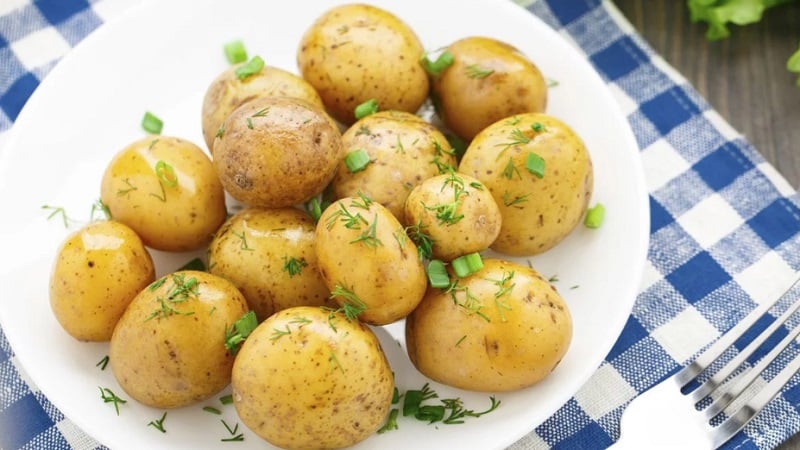
There are over 5 thousand varieties of potatoes, characterized by resistance to diseases and pests, short ripening periods, and high yields.All varieties are conditionally divided into four groups: table, fodder, technical and universal. The most popular table varieties have oval or round tubers with eyes, tender pulp and a starch content of no more than 18%.
The chemical composition and nutritional properties of tubers depend on variety, climatic and weather conditions, agricultural cultivation technology, soil type, storage time and conditions. With proper heat treatment, the beneficial substances of potatoes are practically not lost.
On average, boiled potatoes without peel and salt contain:
- water - 77 g;
- proteins - 1.7 g;
- fats - 0.1 g;
- carbohydrates - 18.2 g;
- dietary fiber - 1.8 g;
- ash - 0.72 g;
- starch - 14.2 g.
The biological value of potatoes as a food product is determined by vitamins. The tubers contain carotene (provitamin A), B vitamins (thiamine, riboflavin, choline, pantothenic acid, pyridoxine, folate), ascorbic and nicotinic acids, vitamin E and K, and betaine.
The acidity of potato juice depends on the content of organic acids. The tubers are richest in citric acid, in smaller amounts - oxalic, lactic, malic, tartaric, isocitric, and chlorogenic. The acidity level for potatoes is set at 5.6-6.2. Fats make up an average of 0.15% of wet weight and are represented by palmitic, linoleic, and linolenic acids.
Boiled potatoes are a valuable source of minerals. Tubers contain calcium, potassium, magnesium, sodium, phosphorus, as well as trace elements - copper, manganese, iron, selenium, zinc. The mineral composition of the raw product is more diverse and also includes silicon, sulfur, chlorine, aluminum, boron, vanadium, iodine, cobalt, lithium, molybdenum, nickel, rubidium, strontium, chromium, zirconium.
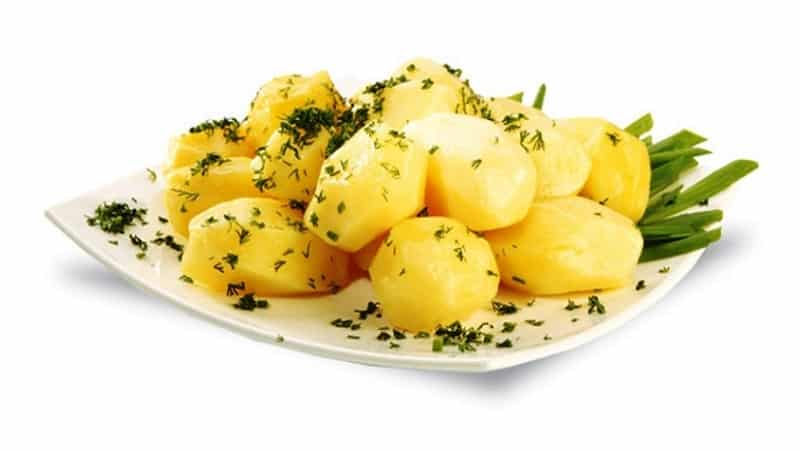
How much sugar is in boiled potatoes
Sugars in potatoes are digestible carbohydrates (based on 100 g of product): sucrose - 0.18 g, fructose - 0.28 g, glucose - 0.33 g. Mature tubers contain little sugar, from 0.5% to 1.5%, but it can accumulate up to 5-6% or disappear completely.
The decisive factor is air temperature, duration and storage conditions.. So at a temperature of +10°C, 3.58 mg of sugar is formed in 100 g of potatoes and the same amount is consumed. At lower temperatures (0-10⁰C), sugar accumulates in the tubers to a certain level, after which it remains unchanged. The most favorable storage temperature will be above +10⁰С, when more sugar is consumed than accumulated.
Sugar levels also depend on the type of potato. On average, 100 g of boiled potatoes contains 0.8 g of sugar, respectively, 1 kg - 8 g.
Reference. A higher concentration of sugar in tubers adversely affects its taste and beneficial qualities: a sweet taste appears, potatoes darken when cooked.
Calorie content, BJU and nutritional value of boiled potatoes
Boiled potatoes with or without skins have almost identical caloric content and nutritional value. The first values characterize boiled potatoes “in their jackets”, the second - boiled without peel:
- calories - 87/86 kcal;
- proteins - 1.9/1.7 g;
- fats - 0.1/0.1 g;
- carbohydrates - 18.3/18.2 g.
Boiled potatoes - benefits for the body
The benefits of boiled potatoes for the body are significant. It is a source of vitamins and minerals, which promote health and beauty, prevention of diseases of the heart, blood vessels, liver, kidneys, nervous and digestive systems.
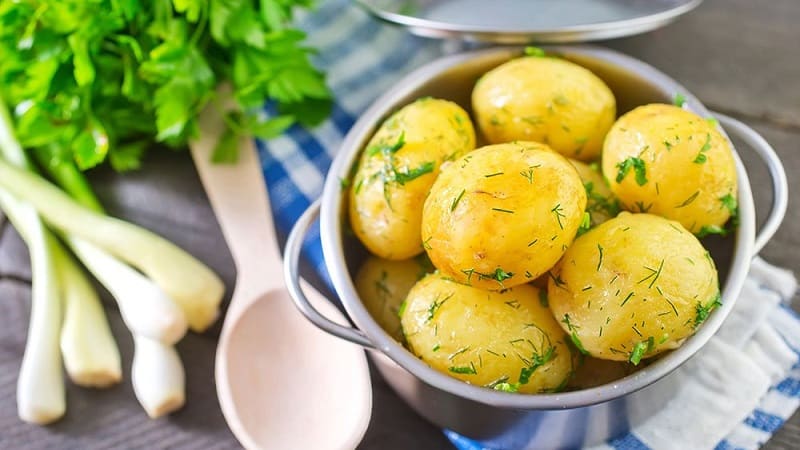
Boiled potatoes are an almost obligatory product in the daily diet.. It is often prescribed as a therapeutic food to reduce body weight and cleanse the body of waste and toxins.
About the beneficial properties of other crops:
The health benefits and harms of eggplants
Biological value and dietary qualities of the product due to the properties of each vitamin in it:
- Vitamin A (beta-carotene). A powerful antioxidant, slows down the aging process, takes part in the formation of new cells, protects the body from colds and genitourinary infections, provides night vision, and is necessary for the full functioning of the immune system.
- Vitamin B1 (thiamine). Supports heart function, the health of the nervous and digestive systems, stimulates the growth of bone and muscle tissue.
- Vitamin B1 (riboflavin). Promotes saturation of blood with oxygen, regulates the activity of the thyroid gland, supports the functioning of the reproductive system, takes an active part in the metabolism of proteins, fats and carbohydrates.
- Vitamin B4 (choline). Responsible for neuromuscular transmission, increases brain performance, improves memory, lowers blood and intraocular pressure, slows heart contractions.
- Vitamin B5 (pantothenic acid). Regulates metabolism, helps control weight, stimulates the production of steroid hormones, which makes it a powerful tool for the treatment and prevention of arthritis of various origins, heart disease, and allergic reactions.
- Vitamin B6 (pyridoxine). Responsible for the metabolism of proteins and fats, the absorption of unsaturated fatty acids, participates in the processes of hematopoiesis, the synthesis of histamine and hemoglobin, reduces cholesterol levels, and inhibits the aging process.
- Vitamin B9 (folates). Promotes better absorption of iron in the body, affects mood, appetite, and the state of the nervous system; without it, normal growth and development of embryonic tissues is impossible.
- Vitamin C (ascorbic acid). Protects a person from viral and cancer diseases, is necessary for the formation of collagen, thereby restoring skin moisture and elasticity, normalizing redox processes.
- Vitamin E (alpha tocopherol). Strengthens the body's defenses, has antioxidant properties, has a beneficial effect on the skin, ensures tissue respiration, and supports the normal activity of the gonads.
- Vitamin K (phylloquinone). Regulates blood clotting processes, prevents the deposition of calcium salts in soft tissues and organs, and reduces the risk of prostate cancer.
- Vitamin PP (a nicotinic acid). Participates in the formation of enzymes and lipid metabolism, improves microcirculation, dilates small blood vessels, has detoxification properties, and relieves swelling.
- Betaine. Improves liver function, prevents the risk of breast cancer, protects skin cells from moisture loss, prevents obesity and Alzheimer's disease.
Use in folk medicine
The properties listed above allow the use of potatoes for prevention and therapy various diseases. Not only boiled, but also fresh grated potatoes and their juice are used as medicinal raw materials.
Hot boiled mashed tubers are especially popular in treatment diseases of the upper respiratory tract and lungs.Steam inhalations over hot potatoes help with coughs, runny nose, bronchitis, sore throat, and pharyngitis.
Boiled potatoes are good for digestive problems: gastritis with high acidity, stomach and duodenal ulcers. The vegetable inhibits inflammation, regulates the acidity level of gastric juice, coats the mucous membranes, protecting against the effects of physical, chemical and mechanical irritants.
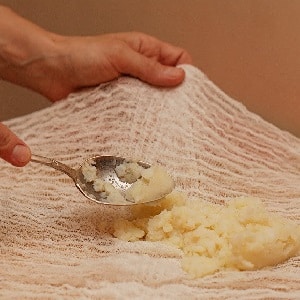 Mashed potato gruel and milk softens, moisturizes, nourishes the skin, smoothes out fine wrinkles.
Mashed potato gruel and milk softens, moisturizes, nourishes the skin, smoothes out fine wrinkles.
What else is boiled potatoes good for? She cleanses the liver and gallbladder of salt stones, normalizes liver function.
The following recipe is used for medicinal purposes:
- Wash 4-5 medium tubers well with soapy water and cut out the eyes.
- Pour 3 liters of water into a saucepan, cook over low heat for 4 hours, add a little salt at the end.
- Grind into liquid puree, cool.
- After a few hours, the puree will settle and a clear liquid will form on the surface. It must be poured into a clean glass container with a lid and stored in the refrigerator.
- Take 2 tbsp. l. three times a day half an hour before meals. The course of treatment is 1.5 months.
Boiled potatoes and mashed potatoes on a diet
There is an opinion that eating potatoes is the reason for the appearance of extra pounds. This is justified if you overuse fried potatoes in oil, seasoning them with high-calorie sauces, adding butter to mashed potatoes. On the contrary, boiled potatoes or in their skins without salt will help normalize and maintain weight, cleanse the intestines of toxins.
 The vegetable is well absorbed by the body, and starch is broken down into simple sugars and does not affect the gain of extra pounds.In addition, the vegetable has low calorie content (86 kcal per 100 g of product), contains virtually no fat, but is rich in carbohydrates and proteins.
The vegetable is well absorbed by the body, and starch is broken down into simple sugars and does not affect the gain of extra pounds.In addition, the vegetable has low calorie content (86 kcal per 100 g of product), contains virtually no fat, but is rich in carbohydrates and proteins.
To preserve valuable substances, the tubers should be boiled in a small amount of purified water. You should not soak potatoes in water for a long time first, as their taste and nutritional qualities change.
The potato diet is based on eating potato dishes, prepared with minimal calorie content, without salt, butter, milk. The effectiveness of the diet will be increased by fresh vegetables and low-fat kefir, which will protect against bloating and gently and gently cleanse the intestines.
There are several options for losing weight on potatoes: fasting day and diet lasting from 3 to 7 days. A fasting day allows the consumption of 1.5 kg of young boiled potatoes in their skins, divided into 4-5 meals. It is allowed to season the potatoes with herbs: dill, parsley, basil, onion. It will take up to 1.5 kg per day. You can use this technique no more than twice a month.
It is recommended to drink plenty of fluids between meals. This could be non-carbonated purified water, green tea without sugar, or herbal tea. It is useful on such a day to drink 200 ml of potato juice made from raw tubers. The juice has a pronounced anti-inflammatory effect, normalizes the functions of the urinary system, stimulates intestinal function, and rids the body of toxic substances.
Reference. Nutritionists recommend spending a fasting day on boiled potatoes for people suffering from hypertension, atherosclerosis, nephritis, and heart failure.
The three-day potato diet is ideal for thosewho wants to quickly lose a few kilograms.During this time, consume no more than 500 g of boiled potatoes without oil and salt, drink at least 2 liters of water per day and unsweetened green tea.
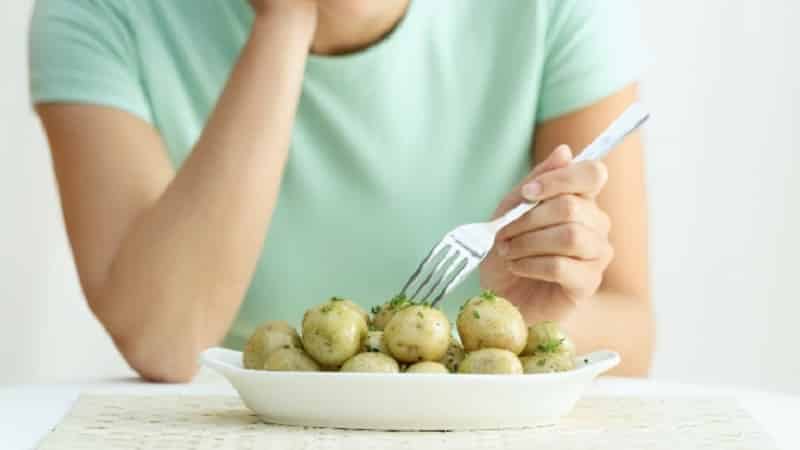
The seven-day diet is more difficult to tolerate, so you can add low-fat dairy and fermented milk products, chicken eggs, fresh vegetables (cabbage, peppers, carrots, asparagus, cucumber) to the menu. To diversify your diet, potatoes can be baked, boiled in pieces or in their skins. If you are very hungry, you can allow yourself 100 g of dietary meat, if you want something sweet - a handful of prunes, raisins or dried apricots, 1 tsp. honey It is recommended to consume the liquid in the same amount - 1.5-2.5 liters of water per day. On average, in a week you can get a good result - minus 2-5 kg.
After finishing the potato dietTo consolidate the effect, familiar products are introduced gradually and in small quantities. It’s better to start with apples, citrus fruits, brown rice, whole grain bread, and after 15-20 days include the rest of the “right” foods. The ban includes alcohol, flour, sweets, fatty and fried foods, spices, white pasta, sausages, semi-finished products, and fast food.
Read also:
Possible harm from boiled potatoes
Harm to health may result from eating potatoes grown with nitrates. Exceeding the permissible norm of nitrates in the body threatens food poisoning, respiratory failure, and increases the risk of cancer.
Vegetable peel contains solanine - a hemolytic poison that usually accumulates in old peels or under the influence of direct sunlight. It causes nausea, vomiting, dizziness.
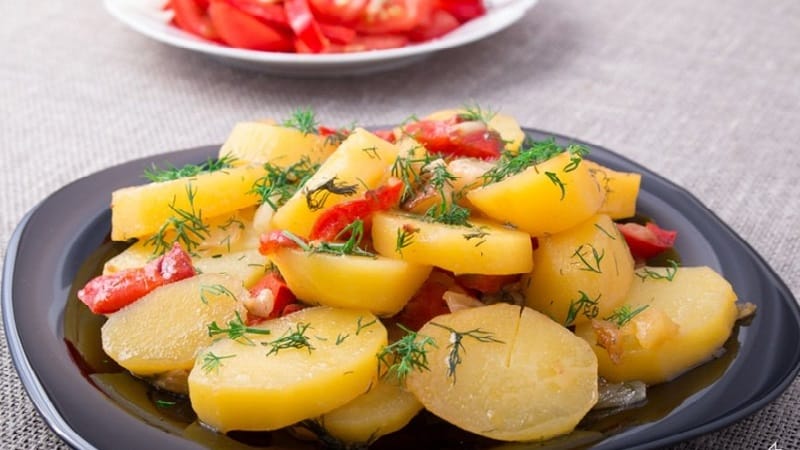
Due to starch content high doses of boiled potatoes can cause disturbances in the frequency and consistency of stools; in people with intolerance to the product, they can provoke an allergic reaction in the form of rashes, peeling of the skin, itching, and Quincke's edema.
Who should not use it
It is recommended to limit or completely eliminate boiled potatoes from the diet for people with allergies to the product, acute urolithiasis, increased gas formation, constipation.
Conclusion
Boiled potatoes are an affordable and satisfying product. If you consume the root vegetable in moderation, then the benefits of boiled potatoes for the body are great: it normalizes metabolism, cleanses the intestines, liver and blood of waste and toxins, improves the functioning of the gastrointestinal tract, and promotes fat burning processes.
The vegetable is easy and quick to prepare and, with proper cooking, retains its beneficial qualities, vitamins, micro- and macroelements. And most importantly, the dishes turn out tasty and satisfying, and are successfully combined with other “right” products.